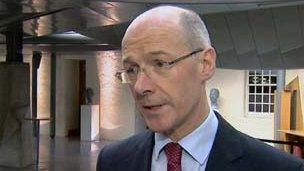Scottish independence: Welsh first minister 'would veto sterling zone'
- Published
Welsh First Minister Carwyn Jones said he would 'want the right to have a say' on any future currency union between an independent Scotland and the UK
The first minister of Wales has warned that he would try to veto any attempt to create a currency union with an independent Scotland.
Carwyn Jones said any such union would represent a "messy" solution that could create instability and have a detrimental effect on Wales.
Mr Jones said he would "want the right to have a say" on any future sterling zone if Scotland left the UK.
The SNP has said a currency union would benefit both parties.
Speaking at Edinburgh University, Mr Jones, who represents Labour, said: "I am not convinced that a shared currency would work from the Welsh perspective.
"If one part of the currency union decides to leave, then that's a matter for them.
"But if an independent nation wants to join, then that is a matter for the people of Wales, Northern Ireland and England - and as the first minister of Wales, I would want the right to have a say."

Finance Secretary John Swinney said a currency union was the 'common-sense' approach
But Scottish Finance Secretary John Swinney said it made "eminent economic and practical sense" to share a currency post-independence.
The SNP has said that in the event of a "Yes" vote in next September's independence referendum, Scotland would retain sterling as part of a currency union with the rest of the UK, arguing that it would be in the best interests of both countries.
However, Chancellor George Osborne has previously said the UK would be unlikely to support this approach.
Asked on BBC Radio Scotland's Good Morning Scotland programme why he would not be in favour of a strong fiscal alliance with an independent Scotland, Mr Jones said: "I just don't know how this works.
"If you have a currency union, who decides on monetary policy? You've got two governments potentially with a view on that.
"It's a very messy system from Wales's point of view. I'd be very, very worried about any currency system that involved the need to get agreement from different governments."
'Common-sense'
He predicted that this would "increase problems", for example if there were to be another financial crisis.
But Mr Swinney insisted a sterling zone was the "common sense" approach for future trading between the two countries.
Speaking to BBC Scotland, he said: "I don't understand the perspective that Carwyn Jones has set out.
"It makes eminent economic and practical sense for us to share the same currency - that's the proposition at the heart of the sterling zone idea."
In the event of a "Yes" vote, he said, the SNP would "expect the the UK government respect the currency position that we've set out".
Further devolution
In his speech, Mr Jones called for changes to the way the three devolved governments in the UK - Wales, Scotland and Northern Ireland - are funded.
He told Good Morning Scotland that Wales was currently underfunded by £300m.
Earlier this week, the Treasury responded to the Silk Commission on the devolution of financial powers to Wales by announcing that Welsh ministers would get tax-varying powers, the full devolution of business rates and early access to borrowing powers.
Mr Jones told the audience in Edinburgh that the agreement showed that further devolution for Scotland could be possible if it chose to stay within the UK.
He said: "To my mind to be a unionist in the 21st Century is to be a devolutionist."